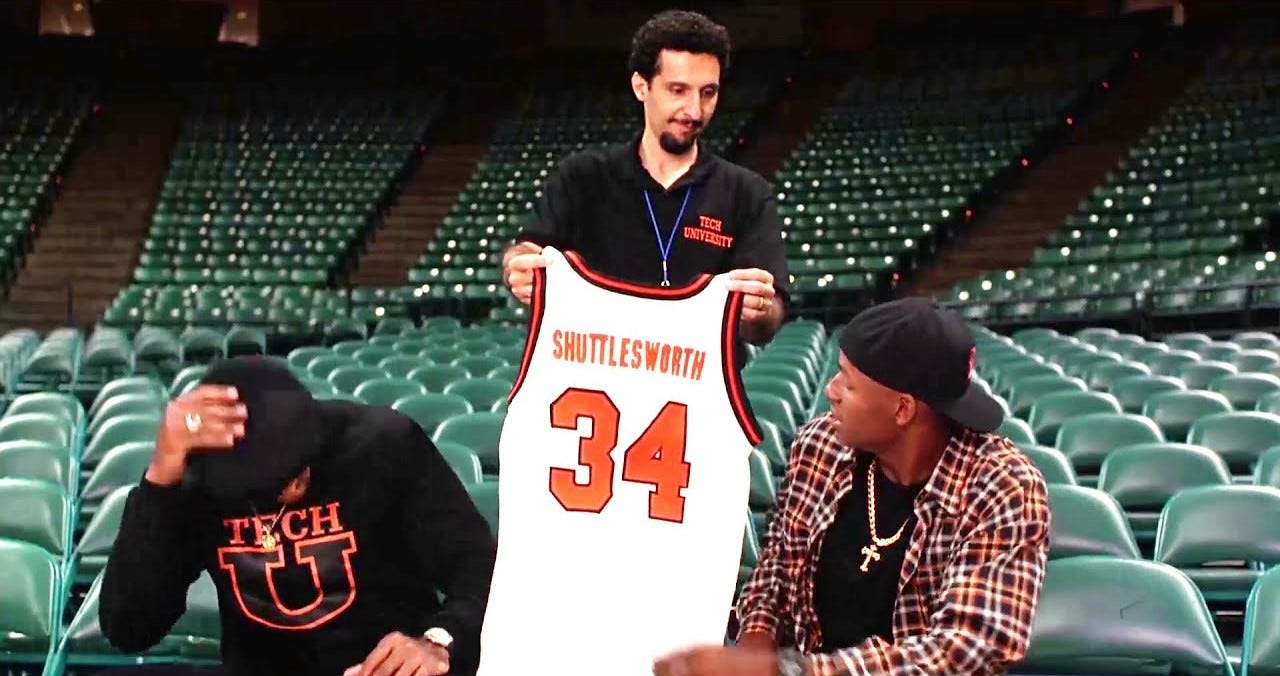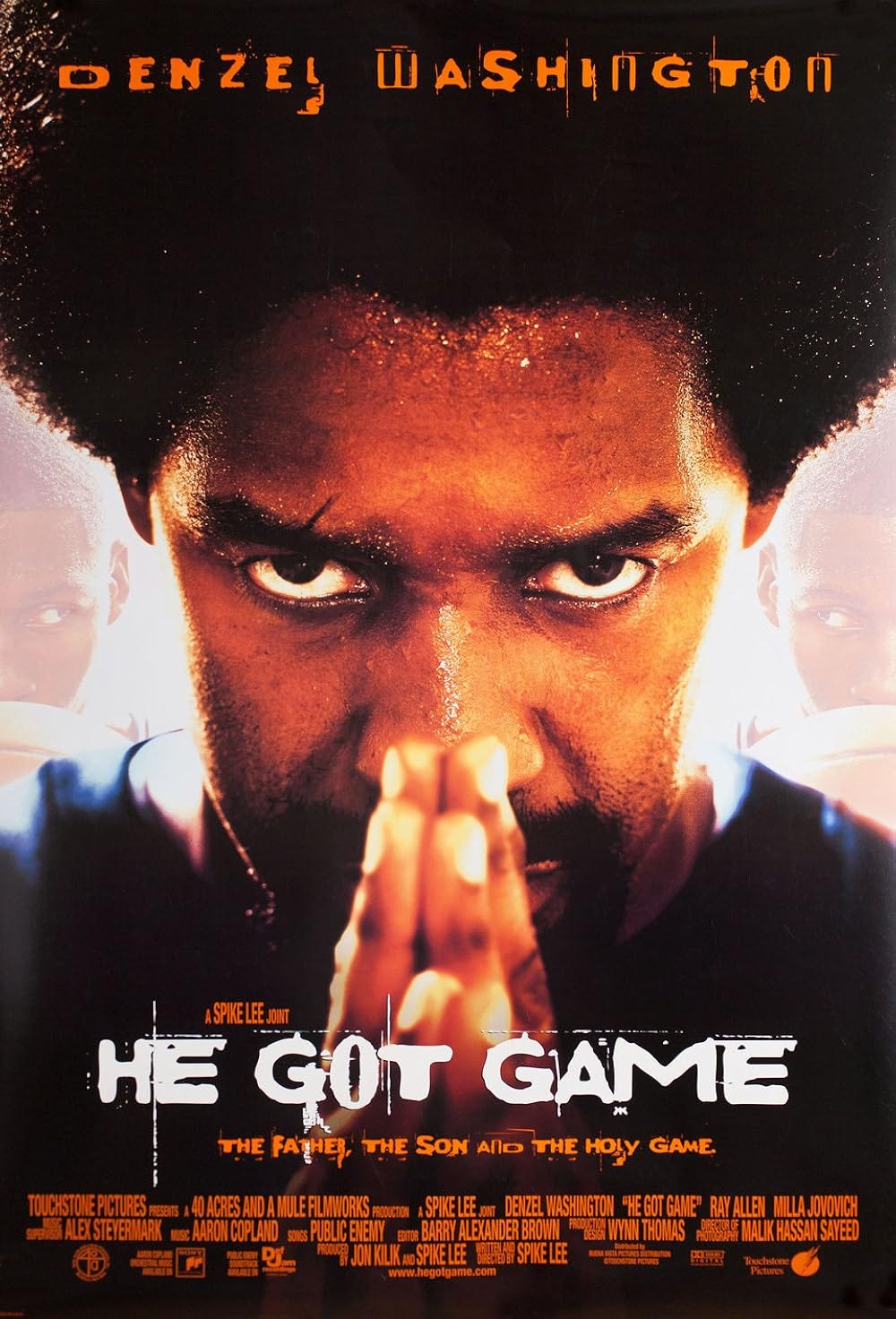I’m always curious about how writers come up with names for their stories.
Lots of filmmakers use proper names as a nod to their influences. If you watch lots of horror movies like I do, you’ll notice plenty of characters with names like Carpenter, Cunningham, and Craven. It’s lazy, but it’s sweet.
Plenty of other filmmakers try to pack their fictional names with symbolic meaning. Sometimes all you need to pull that off is a protagonist named John with a very obvious last name.
I’m as guilty of this sort of thing as anybody. When I was working on the first draft of Don’t Die, I needed an interesting name for our protagonist.1 I settled on the last name “Jenks” as this character’s calling card, which was an ode to Bobby Jenks, a relief pitcher who came up through my hometown Birmingham Barons and then burned brightly for a few years in the major leagues.2 Did this reference hold any deeper meaning? Not really, other than the fact that he was (temporarily) a Birmingham resident. But it stuck.3
One of my absolute favorite things is when film and TV writers are forced to come up with a fictional school setting. If limitations breed creativity as they say, then this is one of the most creative acts I can think of.4 Because all of the most logical names for a college or university have already been taken—by institutions that are probably eager to file a lawsuit for use of their trademark without permission or charge hundreds of thousands of dollars to use it with permission.
The thing about naming a fictional college is that you can’t get too crazy with it. If it’s some zany, off-the-wall name, it can be distracting for the viewer and even diminish the credibility of the story. Sometimes it’s best to keep it simple.
Take Blue Chips, for example, which focuses on Nick Nolte as the head coach of Western University, a clear stand-in for UCLA that can be identified by the location (Los Angeles) and the school colors (blue and gold). It’s simple, it’s clean, it’s available, and it’s believable—especially when Eastern University exists.5 Screenwriter Ron Shelton, the king of the sports movie, even got to throw in a somewhat unique flourish by making the Dolphins their mascot. (Yes, there are colleges with dolphin mascots, but not enough, in my opinion.)
However! There’s a difference between keeping it simple and phoning it in. Unfortunately, the legendary Spike Lee did the latter when he wrote He Got Game.
Before I hurl a criticism at one of the greatest American filmmakers of all time, I’ll pay him a compliment. He did an excellent job naming his lead character: Jesus Shuttlesworth.
He Got Game tells the story of Jesus (played by hall-of-fame shooting guard Ray Allen) and his father Jake (played by hall-of-fame movie star Denzel Washington), who is in prison for accidentally killing his wife and Jesus’ mother. Because Jesus is one of the top basketball recruits in the country, the corrupt governor of New York grants Jake a temporary work release—and the promise of an early release after that—if Jake can convince Jesus to play for the governor’s alma mater.
“Jesus Shuttlesworth.” Hell of a name. Nice ring to it. But it’s deeper than that, of course. The symbolism behind “Jesus” is…well, pretty much the most obvious symbolism one could come up with.6 Because it’s a film about a father and a son, though, it still holds power. And it tells us a good bit about Jake too. It takes a lot of hubris to call your shot like that and expect your son to be the “savior” of basketball—even if he was kinda right.7
And the last name…well, that’s another Birmingham reference, for those who don’t know. A year before He Got Game, Spike released his Oscar-nominated documentary 4 Little Girls about the 16th Street Baptist Church bombing. I don’t know how much time he spent with Reverend Fred Shuttlesworth—Birmingham’s most iconic civil rights activist—when he was filming that documentary, but the reference is pretty clear.8
It’s a shame that Spike couldn’t put the same effort into naming the film’s two prominent fictional schools, though.
You see, the governor’s alma mater is referred to as Big State University. This is upsetting for a variety of reasons. Firstly, if this college is located in New York or even anywhere in the Northeast, those aren’t very big states. I think you have to be situated in California or Texas or Alaska or Montana to call yourselves “Big State.” Secondly, why is this school named for its size rather than its location? To paraphrase Lonesome Dove, “‘big’ ain’t a place, it’s a description.” But mostly, I just hate how uncreative it is. Did Spike have a young niece or nephew at the time? Did he let them name one of the most important things in his film? Because this sounds like something a child would’ve come up with.
Unfortunately, Big State isn’t even the worst fictional college in He Got Game. Because Jesus is also being recruited by Tech University. This is ludicrous. All Spike did was take two words commonly found at the end of a college’s name and smashed them together. “Tech U” is bad enough, but spelling it out as “Technology University” sounds even worse. Can you imagine telling someone that you attended Technology University? They’d think you got an online degree from an unaccredited for-profit college, not one of the premier basketball schools in the country.9
These names aren’t just silly. They’re disappointing. Because I know Spike can do better. In fact, he already had by then.
Spike’s 1988 film School Daze, released one year before his breakthrough feature Do the Right Thing, takes place at a fictional HBCU in Atlanta called Mission College. Now there’s a good fictional name! Spike based Mission College on his own alma mater, Morehouse College, one of the most noteworthy HBCUs to ever exist. And he gave his fictional version a fitting title. “Mission” could represent geography—California is home to both the Mission Beach community in San Diego and the Mission District in San Francisco, so why couldn’t Georgia have a Mission? It could even represent a fictional person—“Mission” is pretty rare, but it does exist as a surname. And if it’s neither of those things, well, it’s still a pretty inspiring noun.
I’d be proud to say that I went to Mission College. Tech U, on the other hand? I think I’d just say I went to “Tech” and hope anyone listening assumed I meant Georgia or Virginia.
He Got Game is now streaming on Starz, and it is available to rent elsewhere.
By the way, Don’t Die now has a trailer and a DVD! I actually didn’t plan on bringing up our movie in this week’s newsletter, but I saw an opening and I went for it.
Bobby died of stomach cancer just four weeks ago at the age of 44. This would’ve been tragic enough already, but after thinking of his name quite often over the past five years, the news hit me harder than expected. May he rest in peace.
My director also insisted that we create a fictional town of Elmore, Tennessee, for the film as a tribute to Elmore Leonard, the king of crime fiction and a big influence on the story we were crafting. I think I wound up reading eight Leonard novels during quarantine. (I think Swag is my favorite.)
Jay Burleson, a friend and a former guest writer for this very newsletter, got to perform this creative act twice when he wrote his Third Saturday in October double feature, which is centered around a fictional college football rivalry between Tennessee A&M University and the University of Alabama at Mobile. (I support the UAM Seahawks because they were inspired by my hometown UAB Blazers.)
Okay, sure, no one’s ever heard of Eastern University. And it was actually called Eastern College when Blue Chips was released. Maybe you would’ve preferred a mention of Northwestern State? (A school that’s actually in the Southeast?)
The religious symbolism is even more potent when Coach Billy Sunday (played by John Turturro) shows up. (I wonder if Spike purposefully chose the name of a baseball-playing evangelical preacher.)
Much like the father of Decoldest Crawford, who did go on to play college football, though his career wasn’t very cold.
I’m guessing that Spike just liked the sound of Fred’s last name and this moniker isn’t meant to equate college basketball with the Civil Rights Movement. But you never really know with Spike.
The scenes that take place at Tech U were shot at Elon University in North Carolina, which makes me think Spike wanted it to be a stand-in for Duke. Also, I’m really glad Elon University exists so that Elon Musk can’t start his own college and name it after himself. (Unless he calls it “Musk U,” which might be even worse than Tech U.)




"Can you imagine telling someone that you attended Technology University?'
My home town has a high school named Tec-Voc (Technical-Vocational) which focuses on career training, and the alumni no doubt have some pride in it.
Have you read that new Elmore biography?